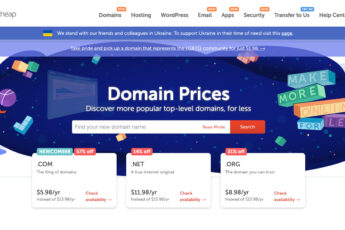🚨 Risky business using PayPal for domain transactions
You just received and negotiated a domain inquiry like a pro.
You’re giddy about your newly finalized agreement. The buyer is ready to pay for the domain, and you’re ready to accept payment quicker than quick.
Everyone is on the same page. Now how do you go about receiving the buyer’s payment and transferring the domain name?
There are many payment options to accept a buyer’s payment.
Whether buying, selling, or leasing, you’re likely tempted to handle transactions with PayPal.
After all, everyone and their grandmother are quite familiar with PayPal as a universal payment system, right?
It might be true that PayPal is a universal payment system for almost everyone that has ventured into the world of online payment processing.
Paypal is good for quite a few transaction types. Should you have an online store that accepts payments, then pay works just fine. It also works quite well with payments for digital goods too.
But I caution you to not use PayPal to handle your domain transaction of any type, especially if you’re the domain seller.
When dealing with transactions via PayPal, PayPal typically sides with the buyer should transactions go awry.
Although you may think it’s less expensive to process domain transactions via PayPal, it could cost you a domain and non-payment of transactions without much recourse.
In most cases, you’ll run across buyers that will attempt to pay you 50% of the agreed too domain transaction fee, have you push or transfer the domain to their account, and then pay the remaining balance once the domain transfer has been successful.
This all sounds good on paper. But what happens should the buyer disappear after a 50% domain deposit is made and a successful domain transfer is executed?
Another ugly side of a PayPal transaction is that the buyer could make all the payments, receive the domain transfer, and then file for a refund of the entire transaction.
Talk about falling for it hook, line, and sinker. Sure, PayPal may save you 10 or likely more percent executing domain transactions.
In my humble opinion, that savings is not worth the insurance that accredited escrow companies provide.
Yes, accredited escrow companies are a bit more expensive, but at least you introduce an honest 3rd party that specializes in domain transactions specifically, and not just digital transactions.
Below is a list of escrow companies worth looking into handling buy, sell, and lease agreements for domain transactions:
- ArmorPayments.com
- DN.com*
- DomainAgents.com*
- DomainAvenue.com
- eCop.com
- Epik.com
- Escrow.com*
- Escrow.Domains
- EscrowTech.com
- Esqwire.com
- GoDaddy.com*
- OnlineNic.com
- Payoneer.com*
- Sedo.com
I’ve personally conducted buy and sell agreements for my domain transactions with the escrow companies marked with an asterisk(*).
I’ve typically handled my own lease agreements since I could always change the nameservers should a customer not pay for a leased domain or website.
Now don’t get me wrong or misunderstand me. PayPal has its place, time, and transaction types it’s specifically made for. Domain transactions, in my opinion, were never made to be handled by PayPal.
It’s like buying a car and using a credit card. Just because some states, dealerships, and credit card providers let you buy a car with a credit card doesn’t mean that you should.
And so it goes with using PayPal for domain transactions of any type. DO SO AT YOUR OWN RISK.
And before I forget, Efty.com and Payoneer.com have partnered and are offering free domain transactions during the month of April. I’ve not used either service, but it might be worth taking a look into.















